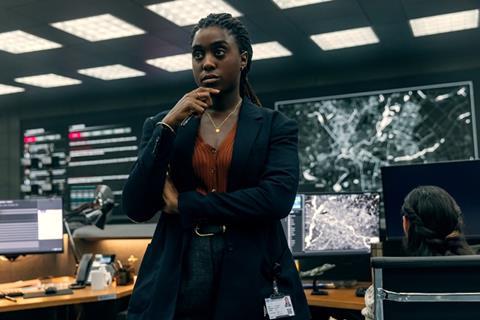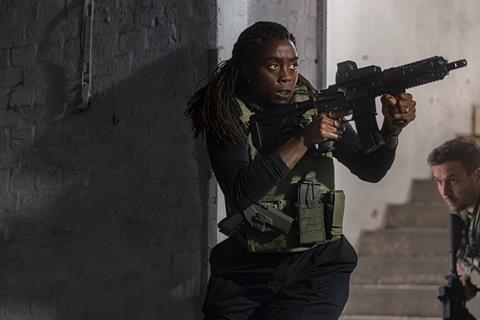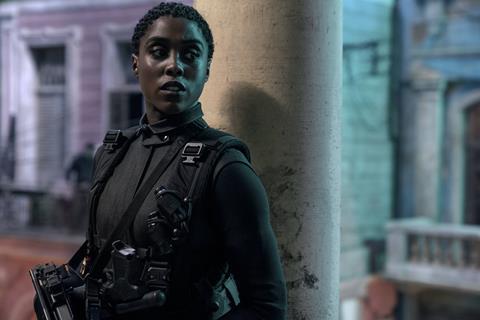’The Day Of The Jackal’ star and producer on getting under the skin of the show’s complex protagonist Bianca

UK actress Lashana Lynch made history when she portrayed Nomi, the first female 007, in No Time To Die. It was an obvious choice for Lynch, who has made a career of playing strong women, from Maria Rambeau in Captain Marvel to Izogie in The Woman King, Miss Honey in Matilda: The Musical to Rita Marley in Bob Marley: One Love.
In the Peacock/Sky Atlantic series The Day Of The Jackal, Lynch returned to the world of espionage as MI6 agent Bianca Pullman, on the trail of an international assassin known only as The Jackal (Eddie Redmayne). Bianca’s desperation to catch up with The Jackal clashes with her domestic responsibilities as a wife and mother, and Lynch’s nuanced performance has seen her so far nominated for a Screen Actors Guild award and a Critics Choice award.
Here, Lynch talks to Screen about the process of getting under Bianca’s skin, her role as a producer and whether she might return to the world of Bond.
Were you familiar with Frederick Forsyth’s original novel The Day Of The Jackal and the previous adaptations?
I wasn’t aware at all, and very much had to do my research. I was told that it was not a remake, and that is always such a delight to hear because I never want to do an iteration that doesn’t make sense to me. When I read the first three episodes, I connected with Bianca, the world and her circumstances, and just how dark it was. It just made sense that we were going to create our own version of the story for modern times while honouring the original.
You have said that you never want to retread old ground in your career; what was it about Bianca that persuaded you to return to the world of espionage?
When I read Bianca on the page, I was reminded of just how much we don’t get to see women on screen who are disliked, brash, have an attitude, but also get the job done. I didn’t want to have to come into a project, especially as a producer, and have to remind everybody about how important it is for this woman to not be liked, because men are not liked on screen all day and they get applauded for it. I was interested in having Bianca be a woman that you could question. Like, ‘I don’t know if I’d make that choice in a workplace, I don’t know if I’d make that choice as a parent.’
How important was it that you came on board in a producing role as well?
There was no way that I could jump on board this project and not become a producer, because it didn’t make sense for me to not oversee everything that offshoots Bianca. There is Bianca herself, then there’s her daughter, her husband, other Black people and women in the workplace. To me, protecting all of these things has a knock-on effect. With my connection to Bond, I knew that some people might naturally think I wanted something a little more slick. I continued to fight against that, through the writing, through what Bianca’s house looked like, through the representation of west London, where I’m from.
Did you speak to real female agents as part of your research?
I spoke to everyone, from the CFO in the Met [Metropolitan Police] to women who have been in MI6. It was such a privilege to be able to sit down with them and hear their honest stories. They wear 1,000 hats a day. It always boils down to this idea that ‘I have a job to do at work, but then I’m someone completely different at home’.
I wanted to specifically speak to women who had troubles in their relationships, and they were very open with me about how tough it is, how much they are away from their children, how they have to split their brain into so many pieces but also remain professional.
The Bianca that you see on screen had to be an amalgamation of everybody. I was determined to ensure that she felt like she was in the dirt all the time, or swimming through treacle.

As well as Bianca’s psychology, you also put a huge amount of effort into her physical representation – the locks, the street clothes. Why was that so important?
It was important for Bianca to feel comfortable in herself at all times. She’s comfortable in her own energy but, physically, I wanted her to able to go on a chase at any minute of the day, leave the country and feel like she’s prepared.
Natalie [Humphries], our costume designer, and I were determined to ensure you could feel her background. Bianca has worked her way up through the ranks, but what if we saw little specks of the person she’s come from, the inner child, the teenager? That’s what makes some of her decisions very wild; it feels like she’s jumping back to being a teenager.
Seeing that within her wardrobe was important to me. Her wedding ring was very rough, the waistcoats are textured to feel feminine but also padded enough to make her feel protected.
I’m excited when people talk about her wardobe and her simple jewellery and her hair, because as Black women we don’t have a lot of opportunities to explore those things and have them be deemed as professional.
You were also heavily involved in post-production. Was that a challenge on such an expansive show?
Me and Eddie were shooting in the same place in the same country most of the time throughout the shoot, so we were able to text each other during the day, meet up for dinner and discuss things. We set up Zooms with our teams and made sure that we were consistently in prep for post-production. I knew post-production was going to be where you fully tell the story. And I didn’t want there to be parts of Bianca’s character, parts of her storyline, parts of her household that didn’t sing in the edit because maybe some people in the team didn’t understand the importance of seeing the Black art on the wall in her living room, or the specific chairs that she has at the dining table.
It was about staying in the conversation, particularly because I’m one of the few Black women in the team, which is our experience everywhere. I wanted to make sure that everyone understood the big why. Why are we keeping this shot of Bianca’s hair? Why are we keeping this shot of her touching her daughter’s hands? Or the shot of her husband kissing her on the cheek? I just don’t see that kind of tenderness with Black couples on screen. If you’re going to have a Black woman at the centre of this story, I want to make sure that you remember her.
Do you feel a responsibility to keep pushing the dial in terms of the projects you choose?
It’s imperative to ensure these female characters live in every single space in ways that shock and surprise us, so that we’re not getting used to a certain type of character. I want audiences to feel like they’re learning something about themselves, to pick apart what it is to be feminine or masculine, how do they sit together? The kinds of roles that I play, whether it be Bianca or Miss Honey or Mrs. Marley, they all have a through line, which is, ‘I come from something that doesn’t make me feel my most powerful self. But now that I’ve gone through my journey, I’ve got so much to say, and you’re gonna listen to me.’

How does Bond fit within that? Is there a possibility we could see you return to play 007?
I haven’t been asked! I do think Nomi was such a beautiful shift for the franchise that seeing her again would make a lot of people happy. If she were to continue to exist, we’d all need her, myself included, to have even more to say. She can’t repeat anything that she’s done before, or even be in exactly the same place that we left her in. We’d have to meet her, years down the line, continue to grow with her. If that is a conversation, I welcome any ideas that come through my inbox.















![[L-R]: Amanda Villavieja, Laia Casanovas, Yasmina Praderas](https://d1nslcd7m2225b.cloudfront.net/Pictures/274x183/6/4/1/1471641_pxl_20251224_103354743_618426_crop.jpg)








![[L-R]: Amanda Villavieja, Laia Casanovas, Yasmina Praderas](https://d1nslcd7m2225b.cloudfront.net/Pictures/100x67/6/4/1/1471641_pxl_20251224_103354743_618426_crop.jpg)